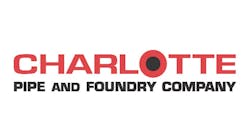Charlotte Pipe Testifies on Chinese Trade Fraud and Evasion Tactics
Key Highlights
- Charlotte Pipe's VP testified before Congress about Chinese trade fraud and evasion tactics
- Chinese exporters undersell products by up to 494%
- Transshipping allows Chinese companies to evade tariffs, often dissolving and re-establishing shell companies
- US Customs has identified active transshipping but struggles to shut down illegal operations
CHARLOTTE, NC — In July, a Charlotte Pipe and Foundry associate was asked to testify before a House Judiciary subcommittee on “Foreign Abuse of US Courts.” The bipartisan hearing was chaired by Rep. Darrell Issa of California (R-48th).
Bradford Muller, Vice President of Corporate Communications for Charlotte Pipe, appeared before the subcommittee on Tuesday July 22, 2025, to provide testimony on trade fraud being committedby unscrupulous producers of cast iron soil pipe and fittings in China.
Dumping Affecting Fair Value
In 2017, through the Cast Iron Soil Pipe Institute, the industry filed anti-dumping and countervailing duty cases again Chinese manufacturers. Dumping is when a foreign producer sells below their cost and “dumps” products into a country at prices below fair market value to take market share away from domestic manufacturers.
They can sell below their cost because they are typically being subsidized by their government—a practice that violates international trade law. That’s why a “countervailing duty” or tariff is applied to products receiving subsidies to level the playing field for domestic producers.
In CISPI’s case, the Department of Commerce determined that Chinese exporters had undersold and subsidized cast iron pipe in the United States up to 345 percent less than fair value. For cast iron fittings, Commerce determined the Chinese had undersold those products up to 494 percent. Duties to counteract these unfair trade practices have been in effect since August 2018.
Transshipping to Evade Tariffs
"In response, unscrupulous foreign entities have turned to transshipping cast iron pipe and fittings through third countries and deploying other forms of evasion and customs fraud to obscure the true origin of their products to avoid paying these tariffs,” Muller testified.
US Customs and Border Protection investigates customs fraud. “In the seven years since our orders were issued, Customs has identified 10 producers who were actively transshipping Chinese soil pipe and fittings—primarily through Malaysia and Cambodia,” Muller said.
“When Customs investigated the locations of these alleged manufacturers in these countries, they found an empty warehouse and a bus stop, but no foundries.”
According to Muller, despite Custom’s good faith efforts, they have been unable to stop the illegal flow of imports. “The Chinese entities have no intention of ever paying the duties. When caught transshipping, the companies simply dissolve, and the bad actors reconstitute under a new shell company to resume their unlawful activity,” Muller said.
Chinese shippers have been so successful evading US trade enforcement that they freely advertise their capabilities to “avoid high duties by exporting goods from China to Southeast Asian countries where we change containers and then re-export to the destination country.”
Stronger Remedies Required
Multiple national news outlets are reporting on the many ways Chinese companies exploit gaps in domestic enforcement to bypass tariffs, duties, and other trade restrictions. Charlotte Pipe was featured in a front-page story in the New York Times on May 27 lamenting the “whack-a-mole” nature of the process of tracking down these fraudulent shell companies and shutting them down—only to see them right back in business under a new name.
“Chinese producers of our products have successfully evaded more than $44 million of dumping and countervailing duties—money they have robbed of the US Treasury,” said Muller. “Congress needs to step in and provide industry with far stronger remedies.”
Charlotte Pipe and Foundry is the nation’s leading manufacturer of cast iron and plastic pipe and fittings for plumbing applications. Founded in 1901 and privately held, the Company is headquartered in Charlotte, NC, and operates eight manufacturing plants across the United manufacturer of municipal castings and operates three plants in the US.
Also in CONTRACTOR
PMI Report Highlights ‘Upstream, Downstream’ Water Solutions
